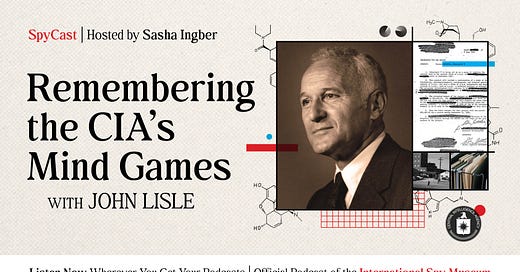On SpyCast: Remembering the CIA's mind games
Historian John Lisle accessed previously unexplored depositions, bringing new voice to the perpetrators and victims of a dangerous program called MK-ULTRA.
In the 1950s, the CIA became deeply concerned with mind control, after American POWs during the Korean War made strange confessions. Why were they saying they had deployed biological weapons when they hadn’t?
The CIA’s covert program, MK-ULTRA, launched in 1953. Under chemist Sidney Gottlieb, the agency funded dozens of controversial experiments on witting and unwitting subjects — patients at mental institutions, men visiting brothels, even government scientists at a retreat in Maryland. Researchers used drugs like LSD and unethical techniques that included “psychic driving” and chemical comas.
“Eventually, the CIA comes to the conclusion that what instigated MK-ULTRA in the first place, the idea that these Korean War prisoners are being subjected to some form of mind control, just isn't true,” historian John Lisle says. “What's really coercing these people into saying things is that they're being tortured, or they're being deprived of sleep, or food deprivation, or some of the other classical methods of coercion.”
John came on SpyCast to talk about his new book, Project Mind Control. He says the 10-year undertaking brought life to conspiracy theories that still haunt the CIA today. And he believes the distrust stemming from this moment may contribute to why some members of the Trump administration call for more oversight of the agency.
The book features previously unexplored depositions from lawsuits that ensued. Some researchers had no remorse. Others expressed regret after the subprojects were laid bare in Senate hearings. In one deposition, John told me, “Gottlieb basically says, ‘Why did I destroy these files? Because I was embarrassed. I didn't want people to know this.’”
I found the depositions from victims particularly disturbing. John described one woman who was supposed to be training as a doctor at a mental hospital but had a breakdown and became a patient instead. Electroshock therapy left her unable to even put on her clothes. Eventually, she escaped with the help of her sister. “I was the lucky one,” she said, according to John. But other patients “didn't have the kind of family that could bust them out.”
Many victims were unable to move past the trauma. And the backlash to MK-ULTRA may have ultimately been the CIA’s greatest lesson from the program.
Episode length: 30 mins
Listen: On Spotify | On Apple Podcasts



